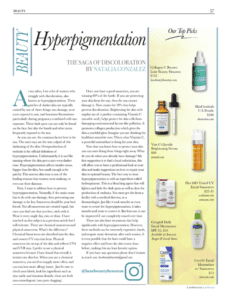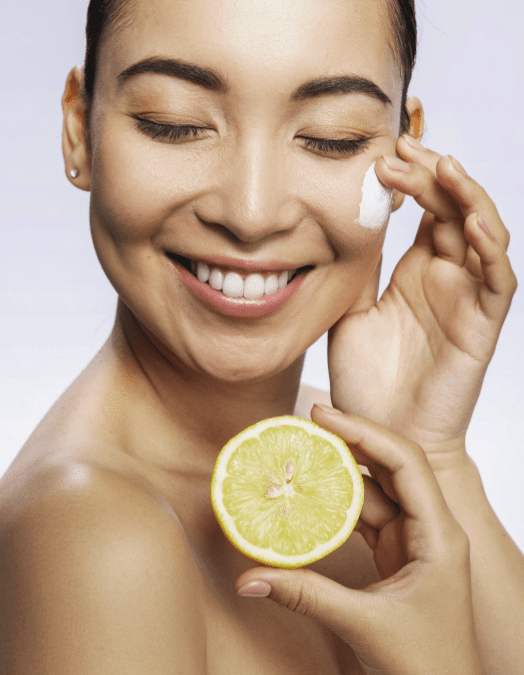
At my salon, I see a lot of women who struggle with discoloration, also known as hyperpigmentation. These patches of darker skin are typically caused by one of three things: sun damage, acne scars exposed to sun, and hormone fluctuations particularly during pregnancy-combined with sun exposure. These dark spots can not only be found on the face, but also the hands and other areas frequently exposed to the sun.
As you can see, the common factor here is the sun. The sun’s rays are the true culprit of this darkening of the skin. Overproduction of melanin is the official definition of hyperpigmentation. Unfortunately, it is not like tanning where the skin gets a nice even darker tone. Hyperpigmentation affects smaller areas, bigger than freckles, but small enough to be patchy. This uneven skin tone is one of the leading reasons that women wear makeup, to even out their skintone.
First, I want to address how to prevent hyperpigmentation. Naturally, if the main cause has to do with sun damage, then preventing sun damage is the key. Sunscreen should be your best friend. Not all sunscreens are created equal, but once you find one that you love, stick with it. Wear it every single day, rain or shine. I have touched on this subject in a previous article but I will reiterate. There are chemical sunscreens and physical sunscreens. What’s the difference? Chemical Sunscreens are absorbed into the skin and convert UV rays into heat. Physical sunscreen sits on top of the skin and reflects UVA and UVB rays. I prefer to use a physical sunscreen because I have found that overall, it irritates my skin less. When you use a chemical sunscreen, you need to reapply more often, and can run into more allergy issues. Just be sure to check your labels, look for ingredients such as zinc oxide and titanium dioxide, these are both non-comedogenic (non pore clogging.)
Once you have a good sunscreen, you are winning 80% of the battle. If you are protecting your skin from the sun, then the sun cannot damage it. Now comes the 20% that helps prevent discoloration. Brightening the skin with regular use of a product containing Vitamin C (ascorbic acid,) helps protect the skin cells from damaging environmental factors like pollution. It promotes collagen production which gives the skin a youthful glow. Imagine you are drinking the healthiest smoothie ever. This is what Vitamin C, a powerful antioxidant is doing for your skin.
Now that you know how to protect your skin you can start doing these things right away. What do you do when you already have damage? My first suggestion is to find a local esthetician, this will allow you to have a professional look at your skin and make suggestions on how to repair your skin to optimal beauty. The best way to treat hyperpigmentation is with an ingredient called hydroquinone. This is a bleaching agent that will lighten and fade the dark spots as well as slow the production of melanin. You must get this from a facility with a medical director, or a dermatologist. Just like it took months or even years to create the hyperpigmentation, it takes months and years to correct it. But fear not, it can be improved if not completely erased over time. There are also laser treatments that help significantly with hyperpigmentation. However, these methods can be extremely expensive, harsh, and require some downtime after each session. It is even possible that the laser could have a negative effect and leave the skin worse than before, making this my least favorite option.
If you have any questions please don’t hesitate to reach out. luxebeautyhouston@gmail.com
@luxebeautyhouston
BY NATALIA GONZALEZ


